Turning Off the Heat After Winter: 5 Key Steps to Take
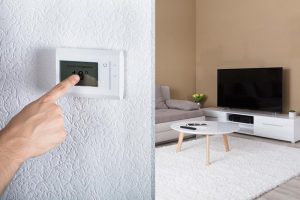
Here are five crucial tasks that to take care of when turning off your heat this spring.
1. Change Your Filters
Your furnace filter needs to be changed at least once every 90 days. In fact, you may need to change it once a month if someone in your home has allergies, asthma and/or other respiratory problems. Pet owners also need to change their filters more often than the average household. Dirty filters don’t only pollute the air inside the home, but they can also cause dust to settle in your ductwork.
2. Check the Thermostat
The thermostat switch should be set to auto rather than on. If you leave it on, your HVAC system’s blower will keep running even though the furnace is off. This setting not only wastes energy blowing air that has not been cooled or heated, but it can raise the humidity level in your home as well for the same reasons–the air you are circulating has not been cooled or heated.
3. Turn Off the Gas
If your furnace is an older model that has a standing pilot light, be sure to turn off the gas so that it is not used up by a pilot light that does not really need to be on at this time of the year.
4. Check Your Carbon Monoxide Detectors
Furnaces are one of the leading causes of carbon monoxide poisoning. To avoid the dangers of being exposed to potentially deadly carbon monoxide in your home, it is imperative to have a good carbon monoxide detector installed near your furnace. Because you probably won’t take a close look at your furnace again until you turn it on next winter, check your carbon monoxide detector while turning off the heat to make sure it is in good working order.
5. Have the Furnace Serviced
Most heating and cooling companies advise consumers to have the furnace serviced during the fall, right before you turn it on for the winter. However, the truth is that it can actually be hard to get quick service at the same time everyone else is calling local furnace companies for an annual tune-up. Have your system carefully checked and cleaned well in advance to avoid the last-minute rush of finding a contractor who can provide the service you need at a time that is convenient for you.
At Cox Heating & Air Conditioning, we have been in the heating and cooling business for well over half a century. We offer a variety of services and new products for homeowners who want to upgrade to a new furnace or HVAC unit. Contact us today for expert advice and service from one of the company’s many NATE-certified technicians.
AC Unit Corrosion: What You Need to Know
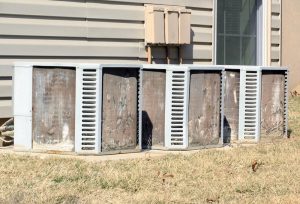
However, air conditioning can also be expensive and require regular maintenance. Especially in humid areas, outdoor air conditioning units may wear out and corrode faster. Regular maintenance of air conditioning systems will make them last longer, run more efficiently and may even save you money.
Here’s important information about AC unit corrosion.
Why Does Corrosion Occur?
There are two main types of corrosion: pitting corrosion and formicary corrosion. Exposure to fluoride and chloride will wear down and thin the coils on your AC system. Fluoride and chloride linger in the air in humid coastal areas. A pleasant salty breeze might be refreshing, but it can be bad for your air conditioning system. If you live in a humid coastal area like Florida, you are at greater risk for AC unit corrosion.
Formicary corrosion can hurt the metal parts of your air conditioning systems if not cleaned properly. Many cleaning products can damage can wear down the protective coatings on metal parts and hurt your system. This is why you must be very careful about trying to clean the system yourself. It may be best to work with an HVAC professional who can help protect your outdoor AC unit.
How Does AC Unit Corrosion Affect Me?
Corrosion can be an expensive problem. If not dealt with it can require coil replacement or even and entire system replacement. Experts recommend scheduled HVAC maintenance to protect against corrosion. If you live in a hot coastal area, you may want to consider purchasing an Air Conditioning Maintenance Service Agreement because of the higher risk to your system. Salty air in places like Florida can rust condenser fins, terminal blocks, wire harnesses and other metal contact points faster, and regularly scheduled maintenance can help alleviate these problems.
What Should I Do About It?
Regular maintenance is the best way to prolong the life of your air conditioner. Experts can apply various protective coatings to increase the life of your system and prevent corrosion. Furthermore, regular maintenance on your system is a must to keep it working at peak efficiency and to avoid costly repairs.
In Florida, the Gulf and other coastal areas, systems are at greater risk. At Cox Heating & Air Conditioning, we provide the professional service and advice you need to maintain your AC system, protect your home and save money. Contact us today to schedule an inspection or maintenance on your AC system.
5 Reasons to Install a Heat Pump Now
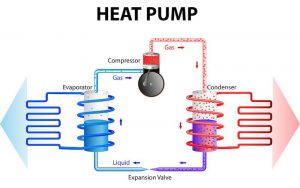
1. Useful Year-Round
Heat pumps aren’t just an excellent heat source during the winter. They also come in handy during the hot summer months. When the weather is warm, your unit will move warm air out of your home. When the weather gets cold, it will pump warm air into your home. While these units aren’t well-suited to cold northern climates, they are ideal for Florida winters that are chilly yet not too cold.
2. Lower Utility Bills
Heat pumps use less than half as much energy as a typical HVAC unit or furnace saving you money on your heating and cooling costs. If you want to keep your home at a comfortable temperature without spending too much on your energy bill, then this device is your best bet. They are particularly ideal for chilly spring days when you don’t want to spend a lot of money to run a heater but it’s not quite warm enough to turn off the heater altogether.
3. Eco-Friendly
Heat pumps don’t just conserve energy. They are also very eco-friendly devices that drastically reduce carbon emissions. Because these units simply move heat around, they don’t need to use fossil fuels.
4. Available for Installation Now
Air conditioning and heating companies are not as busy now as they tend to be during other times of the year. If you want quick installation service to suit your busy schedule, then schedule an installation appointment before the beginning of spring.
5. Have Many Options
There are now more heat pump options available than ever before, making it easy for you to choose the one that suits your exact needs and budget. Cox Heating & Air Conditioning offers Carrier heat pumps in all types and sizes. Not only are these top-quality products, but you’ll also enjoy unbeatable service and installation.
If you want to save money on energy bills, help the environment and keep your home at just the right temperature year-round, then installing one of these high-quality units should be at the top of your priority list. Now is a great time to do so. Contact Cox Heating & Air Conditioning at your convenience to learn more about your options, costs and installation services or to have one of our skilled technicians come to your home and offer personalized recommendations.
4 Benefits of a Winter HVAC Inspection

1. Your HVAC Company is Probably Less Busy in the Winter
In Florida, summer is obviously the busy season for HVAC companies, as they work to keep people cool during the sweltering Southeastern summer. Business slows down significantly during the winter, meaning companies may be more flexible and accommodating to your schedule.
2. Regular Maintenance Is Always a Good Idea
If you’re due for an HVAC inspection, anytime is a great time. There’s no need to wait until spring to have an expert look at your air conditioner. HVAC systems that are regularly inspected and properly maintained can last for many years and will operate more safely and efficiently than those that aren’t.
3. It’s Better to Have an Inspection Now Than a Repair Later
Keeping up with maintenance now can save you from expensive and inconvenient trouble down the road. If a problem with your AC is caught during your winter inspection, you can have the necessary repairs done before you have a breakdown on a 90-degree day when all the HVAC companies are booked out for days.
4. Winter Inspections Help You Plan for Summer
If you schedule an HVAC inspection during the winter, you can discuss your options for improvements before summer comes back around. If you’re looking for ways to increase energy efficiency or save on your summer cooling bill, there may be some things you can do during the winter to make sure your air conditioning system is ready to go by the time summer hits.
What to Ask Your HVAC Specialist
There are several topics you may want to bring up with your HVAC company when they come out to do your winter inspection. Here are a few questions:
- What can I do to save energy in winter and summer?
- Is my house properly sealed to prevent heat loss in winter and keep me cool in summer?
- Can you tell me about carbon monoxide? Do you test for it?
- Am I using the right filters?
- Is there an HVAC system that might work better in my home than my current system?
You should never wait to have an overdue inspection done on your HVAC system. Always be aware of the red flags indicating that you have urgent issues that need to be addressed. Here are a few to watch for:
- Your heating bill is suddenly much higher than usual
- You feel cool drafts in your home during the winter
- There is noticeably inconsistent airflow from the different vents in your home
- You notice dramatic temperature differences between rooms
- Your heating or cooling equipment seems to be performing poorly
Regular inspections and maintenance of your HVAC system help ensure you stay comfortable in your home, no matter the time of year. Contact Cox Heating & Air today to schedule an HVAC inspection or any other type of service, and one of our professional, licensed HVAC technicians can inspect your HAVC system to ensure you are ready for Florida’s hot summer days.
3 AC Servicing Tasks to Complete This Winter
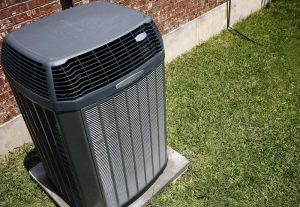
1. Perform a Thorough Inspection
Have a professional HVAC technician perform a complete inspection of all the components in your HVAC system before you use them. Doing so can ensure that any potential problems are addressed quickly and efficiently. You can then turn on your cooling system with confidence when needed, knowing that it will work well for you during the hot summer months.
On the other hand, a complete inspection may show that your system needs to be replaced. If this is the case, it’s best to do the replacement job right away. HVAC companies are not as busy during the winter as they are during the summer, so you should have no problem having a new HVAC unit installed in a timely manner.
2. Change Your Filters
The U. S. Department of Energy notes that changing clogged, dirty air filters can reduce energy consumption by up to 15 percent. You only need to change your filters once every three months if you don’t have pets; however, homes with one or more pets or with people who have breathing problems may need to change filters every 20 to 60 days.
3. Clear the Area Around Your HVAC Unit
Consider one more often-overlooked AC servicing task: Don’t allow grass, bushes or trees to come within a 1-foot radius of your unit. If you notice debris, grass or brush around your unit, clear it away to prevent HVAC problems and to ensure your unit will run efficiently both now and in the future.
It’s all too easy to take your HVAC unit for granted until you turn it on one hot summer day and discover that it isn’t running well. Thankfully, you can drastically reduce the odds of this situation by following the tips outlined above. At Cox Heating & Air Conditioning, we offer heating and AC servicing, repair and maintenance to meet any homeowner’s needs. If you need professional maintenance, are considering investing in a new HVAC unit or have an issue that needs emergency repair, contact us at your convenience to have one of our NATE certified technicians examine your unit and offer personalized, expert advice and assistance.
5 Easy Ways to Lower Your Heating Bill

1. Lower the Thermostat
One surefire way to save on your heating bill is to lower the temperature in your home. When it’s chilly outside, put on a sweater or cuddle up under a blanket rather than cranking up the heat. Putting warmer sheets and blankets on your bed in the cooler months is another way to fight the temptation to turn up the heat every time the outside temperature drops. The EPA says that for every one degree you turn your heat down, you’ll use about one percent less energy.
2. Get a Programmable Thermostat
Programmable thermostats can save energy (and money) compared with their old-fashioned counterparts. Installing one can save you up to 30 percent on your cooling and heating bill, and it’s a lot more convenient than manually adjusting your thermostat all the time. You never have to worry about turning the heat down at bedtime or off when you leave for work.
3. Seal Off Your Home
Homes can lose a lot of heat through doors, windows, cracks and other openings. Make sure your home is well-insulated and that all your windows are properly installed and sealed. Check under doors for gaps that could cause heat loss, and inspect your home for cracks and other hidden sources of lost heat.
4. Recommended Routine Maintenance
Make sure your HVAC system is on a routine maintenance schedule. Keeping your heating unit running properly and having your ducts cleaned and filters changed regularly will save you lots of money and energy over time, and the air in your home will be healthier. If your furnace is on the verge of a breakdown, consider upgrading to a more energy-efficient model.
5. Be Water Wise
Sometimes when we think about our heating bill, we aren’t considering all the hot water we use in our homes for things like showers, baths, laundry and dishes. There are so many ways we use hot water every day, and it adds up quickly. There are plenty of ways you can cut down on hot water usage without feeling as if you’re depriving yourself. A few options include:
- Take shorter showers.
- Install low-flow shower heads.
- Invest in an energy efficient washer and dishwasher.
- Keep your hot water heater in good repair.
- Repair any leaks or other plumbing issues right away.
If you want to upgrade your heating and cooling system or find out more ways to cut your heating bills, get in touch with Cox Heating & Air Conditioning today. Our friendly service and knowledgeable technicians demonstrate why Cox has been a favorite HVAC company since 1958.
4 Tips to Stay Comfortable in Your Home This Winter

1. Consider Investing in a New Heating System
Naturally, there are costs to consider when investing in a new heating system. However, there are instances when such an investment is your best or even only option. If your system is old, has had regular mechanical problems or is the wrong size for your home, consider new heating system options to choose the best for you. Cox Heating & Air Conditioning stocks a number of high-quality Carrier heating systems, including gas and oil furnaces, packaged system and mini-splits. What is more, we offer professional assistance to help you understand all your options.
2. Maintain Your Heating System
Even the best heating systems need regular maintenance in order to be effective. Schedule service with trustworthy technicians to keep your system working properly for the winter. Additionally, make sure to perform certain tasks to keep your HVAC unit in good working order, including replacing air filters as often as needed, cleaning registers and removing clutter from around the furnace.
3. Check for Leaks
A home that doesn’t maintain a comfortable temperature does not necessarily signal HVAC problems. If your HVAC is relatively new and has been regularly maintained, you may need to check your home for leaks. Air can leak from holes in the roof, cracks in window panes and under doors. In other instances, faulty ductwork may need to be repaired in order to plug leaks.
4. Install Carbon Monoxide Detectors
If you have regular headaches, feel weak or dizzy and/or experience shortness of breath in your home, then carbon monoxide poisoning may be the cause. Carbon monoxide gas is odorless, and many people don’t realize that it’s in the air until it’s too late. Keep your home both safe and comfortable this winter by investing in carbon monoxide detectors for every single room in your home. Have a professional install the devices and check the batteries twice a year. If the carbon monoxide alarms go off, get everyone out of the home and then call your local police or fire department.
You deserve a comfortable home, particularly during the cold winter months. If your home feels uncomfortably cold or you find yourself feeling chilly in one or more rooms of the home, consider the tips outlined above. Our professional certified HVAC technicians are an excellent resource for addressing any problems you encounter. If you want to schedule an appointment, contact Cox Heating & Air Conditioning today.
Got Pets? Here Are 4 Tips to Improve Indoor Air Quality

1. Invest in an Air Purification System
A high-quality air purification system does not just remove bacteria, dander and other unwanted particles. It will even get rid of odors, including those associated with pets. You can choose from a number of systems, but several highly recommended devices include the Air Knight REME Air Purification System, the Carrier Infinity® purification system and Carrier Comfort air purification system.
2. Buy a Ventilator
Installing a ventilator in your home is a relatively easy and affordable step to take. A ventilator removes old air from your home and brings in clean, fresh air. The Environmental Protection Agency (EPA) recommends installing a ventilator in any home that does not get sufficient fresh air on a regular basis. These devices are also recommended for homes with children, elderly individuals and people who have breathing problems. Unlike air purification systems, ventilators do not kill germs and bacteria in the air; however, they do get rid of allergens, stale air and bad smells.
3. Change Air Filters Regularly
Homeowners who do not have pets are advised to change their air filters every 90 days. However, those who own a dog or cat should change air filters every 60 days. If you own more than one pet and/or someone who lives in your home has breathing problems, you will need to change your filters every 20 to 45 days. Changing filters is a relatively simple job that you can tackle without professional help.
4. Vacuum or Sweep Regularly
Cats and dogs regularly shed hair, but that doesn’t mean you need to put up with hair and dander all over your home. Vacuum carpets regularly to get rid of hair, dander and small pests that may have hitched a ride on your pet and gotten into the carpet. If you have tile or hardwood floors, sweep often to remove allergens and particles that could cause health problems for those in your home.
If you need professional help to keep your home’s air clean or install a ventilator or air purification system, Cox Heating & Air Conditioning in Tampa can provide you with the timely assistance you need. Our company has been in business for well over half a century and offers a multitude of services and amenities to help you keep the air in your home clean and smelling great at all times.
How a Ventilator Can Improve Your Indoor Air Quality
If you have discovered that your air quality is not as high as you would like it to be. The reason could be odors lingering in rooms where they aren’t expected or mold, dust and other common air quality problems.
Many homeowners, especially those with small children, may want to take steps to improve the air they breathe inside their homes. But what can be done to improve indoor air quality? Many homeowners are considering ventilators to increase air flow throughout the home. These devices can solve many indoor air quality issues.
Ventilation Basics
The Environmental Protection Agency recommends improving a home’s ventilation by increasing air flow. Leaving a door or window open will bring in outside air, but many homeowners, understandably, don’t like to do that. After all, propping open doors or windows can let precious (and pricey) cool or warm air leak out and allow insects and other pests to come in.
But it’s important for homes to have some kind of ventilation. In a tightly sealed home, you’ll be living with continuously stale air, where odors, natural gases and chemical vapors can build up. Fortunately, ventilators are an easy way to improve air quality, cut down on odors and provide fresh air.
How Do Ventilators Work?
Ventilators exhaust stale indoor air and replace it with fresh, conditioned outdoor air. This breaks up the number of pollutants in certain areas of your home where they tend to linger. By regulating air flow, ventilators can ensure that any source of pollutants or allergens in your home will not be too concentrated in a certain area. This can help homeowners concerned about mold, certain types of dusts or pet hair that may accumulate and make certain rooms dusty or dank.
Should You Get a Ventilator?
ventilators typically don’t rank high on a homeowner’s to-do list. However, ventilators can dramatically improve the airflow throughout a home and the quality of that air. Ventilators are especially beneficial in homes where the elderly, children or people with compromised health live due to improved air quality.
If you want to improve the air quality of your home, boost energy efficiency or upgrade your heating and cooling system, contact Cox Heating and Air Conditioning today. They are a trusted HVAC company, serving the area since 1958.
Considering a New HVAC System? Winter May Be the Perfect Time
Your HVAC system may be more complicated than you think. Most have both heating and cooling components (an air conditioner and a furnace) plus a system of ducts and thermostats to provide air flow throughout your house. An effective HVAC system is vital to a comfortable home. If something goes wrong, you need to address it immediately. Repairing an HVAC system can be an intimidating prospect, and, in some cases, a new HVAC system is the best answer.
Replace and Repair in the Fall or Winter
There are a number of reasons fall or winter may be the best time for inspecting your system, repairing your current system or getting a new HVAC unit. First, taking care of any leaks or inefficiencies in your air distribution system will ensure that you maximize energy efficiency throughout the winter. This can save you money on heating bills. Further, air companies may be in less demand during the cooler months.
How to Know When to Replace
If your HVAC system was not keeping up with warm weather during the summer, it likely won’t keep up in the cold weather either. The size and condition of your system may mean that it’s time to revamp it. The system can be too small, meaning you are not sufficiently heating and cooling your home year-round. Or it can be too large and costing you money on inefficient heating and cooling energy. If you live in a humid area like Tampa, the wrong-sized system will not balance humidity levels properly. Finally, if your heating and cooling costs seem too high, it might mean it’s time to upgrade to a new HVAC system that is more efficient. A professional HVAC specialist will be able to test your system to see which solution is best for you.
Preventative Maintenance
Your HVAC system also requires regular maintenance. Purchasing a Maintenance Service Agreement is the best way to ensure your HVAC system is properly maintained year-round. During routine maintenance appointments, your HVAC technician will replace filters, remove any debris, clean condenser fan blades and many other necessary tasks. IN addition to keeping your system running well during both hot and cold weather, routine maintenance can save you money in the long run and may help you avoid costly emergency repairs.
Don’t get left out in the cold if you need to revamp or repair your home heating system. The professionals at Cox Heating & Air Conditioning in Tampa can help.














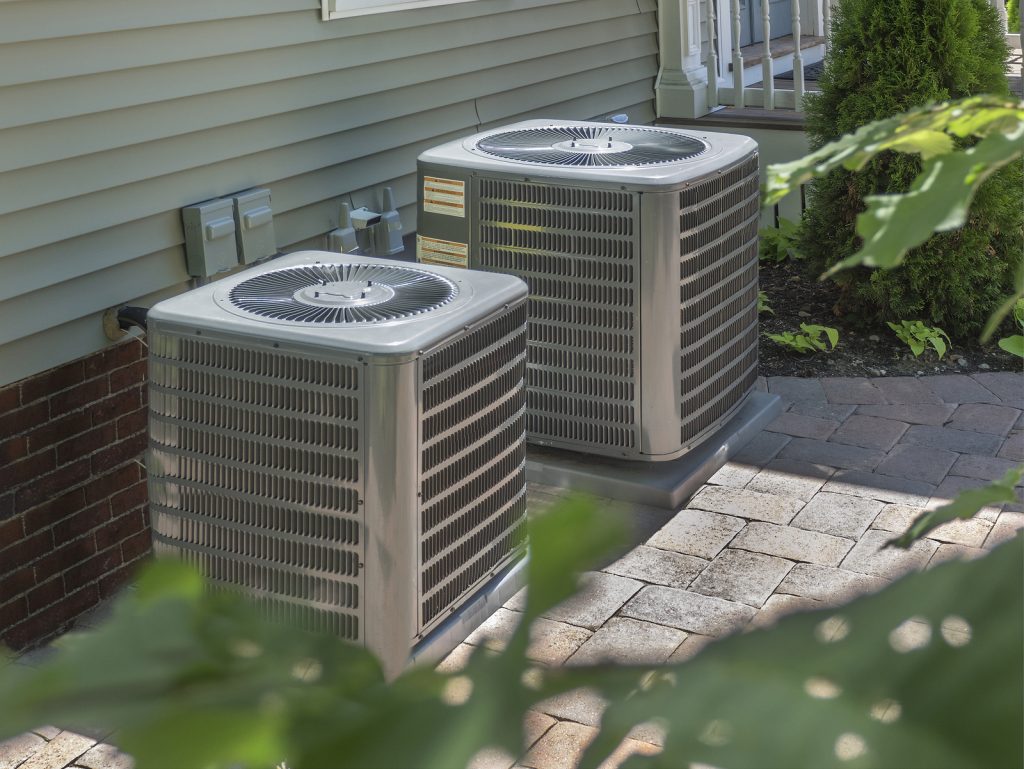

Recent Comments